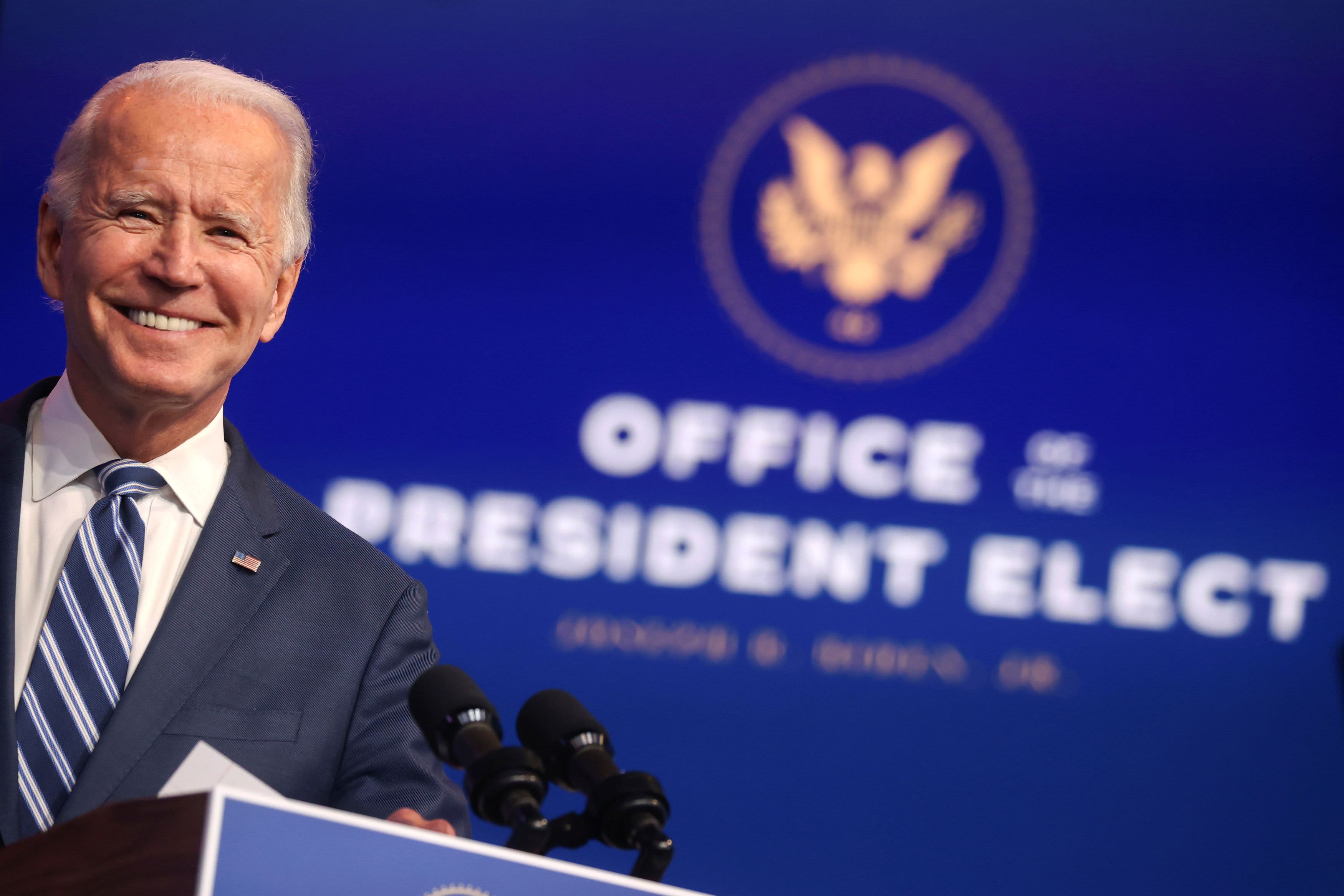
Members of a mariachi band look on as Democratic U.S. presidential nominee Joe Biden discusses the disproportionate ways coronavirus disease (COVID-19) has impacted Latinos in Nevada during a campaign stop at the East Las Vegas Community Center in Las Vegas, Nevada, October 9, 2020.
Kevin Lamarque | Reuters
The election of Joe Biden to the Presidency carries significant economic implications affecting all Americans, ranging from tax policy to educational initiatives, and more. In particular, some of the Biden team’s proposed policies may have profound impacts on the Latinx community. We spoke with Rich Prinsinzano, Penn Wharton budget model director of policy analysis to discuss some of his findings as described in the PWBM Analysis of the Biden Platform.
Over the long-term, the model projects Biden’s policies would decrease federal debt by 6.1% and increase GDP by 0.8%. The nuances of the plan also carry more specific significance for some segments of the population, such as the Hispanic community.
Tax Policy
While Biden’s tax plan calls for an increase in taxes for high-income earners (broadly defined as those earning above $400,000 per year), Prinsinzano said that the vast majority of Americans would be unaffected and experience no tax increase.
“There’s basically no increase in marginal tax rates for anybody,” he explained. “Employment taxes may increase for individuals over $400,000, and the income tax rate would be higher for households earning over that amount annually, but that constitutes only the top 1% of income earners. The reality is that the increase in taxes affects very few households, so Hispanics will mostly be part of that majority that will be unaffected.”
Still, Hispanics earning above the $400K threshold may experience some tax increases. And some of Biden’s other tax policy proposals – such as taxation of capital gains at traditional income rates, as well as increasing taxes on corporate foreign-earned income – could impact certain Hispanic investors or business owners.
Education
Immigration
Perhaps one of the biggest policy differences between a Trump and Biden administration is management of immigration. In fact, the Penn Wharton Budget Model suggests that Biden is likely to model his immigration policy on the 2013 Border Security, Economic Opportunity, and Immigration Modernization Act, which, according to the PWBM study:
A 10-year transition to lawful permanent resident status for undocumented immigrants, including immediate work permits to transition them to full legal status. Drawing on a CBO analysis of the 2013 bill, S. 744, we estimate that two-thirds of unauthorized immigrants would gain legal status under Biden’s plan.
Prinsinzano goes further in describing the economic boost likely to be generated by this policy proposal. “There are proposals from the Biden campaign for a path to citizenship bill similar to what was proposed under the Obama aministration, and we ran that through our models. We found it’s good for the economy. Immigrants — especially Hispanic immigrants — tend to have more children, which grows the economy.” As he explained population growth tends to increase economic growth through channels such as increased consumption and tax contributions.
The impact of Biden’s immigration policies is also likely to be felt by highly-skilled immigrants such as those seeking H1-B visas. This type of visa allows U.S. employers to temporarily employ foreign workers in specialty occupations including those in STEM fields.
“The H1-B visa limitations would likely be undone by Biden, and that would be a positive boost for the economy, since Trump’s proposal to shut that off would limit the number of highly skilled professionals entering the country,” said Prinsinzano.
Finally, Prinsinzano noted that a Biden Administration may affect trade with Latin American countries. Trump’s re-negotiation of NAFTA and other regional trade agreements impacted some Latin American nations, and Biden may seek to further re-negotiate these.
“Trump re-negotiated NAFTA, and other agreements, which could impact trade in the region. Some of the changes Trump made affect Central American countries,” Prinsinzano pointed out. “Biden, similar to Trump, could change some trade deals.”
Whether the changes proposed by Biden are a net negative or positive for your household is dependent on several personal factors and preferences. Nonetheless, one thing is for certain: the tenor of the overall impact on Americans – including Hispanics – is likely to represent a seismic shift from the current policy environment.




